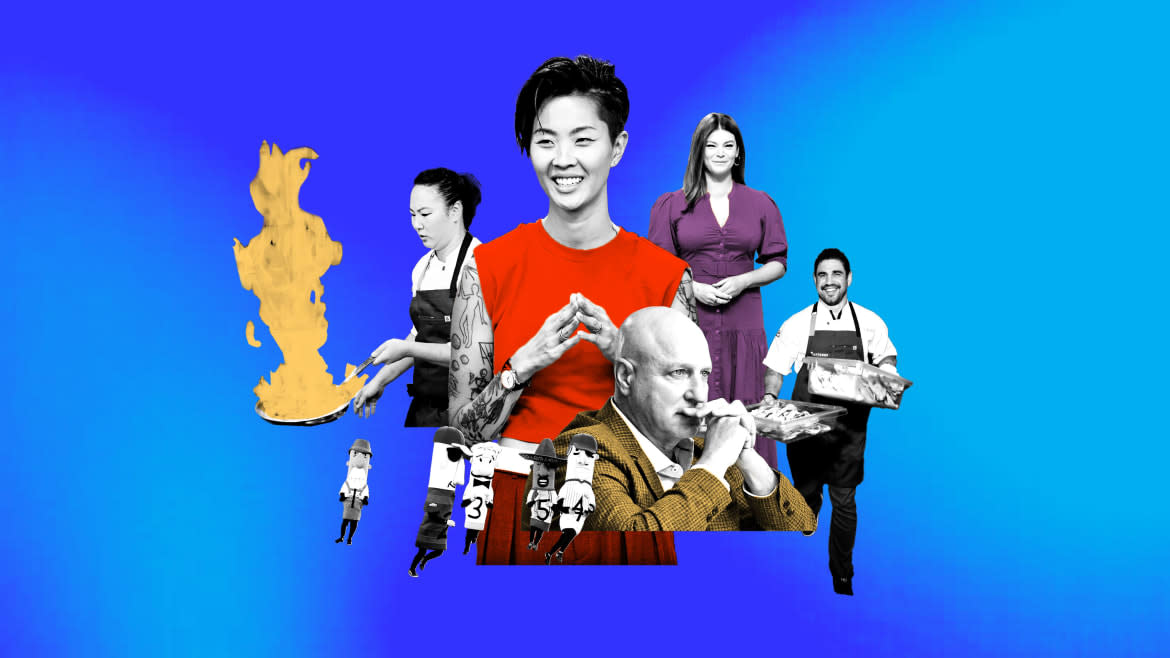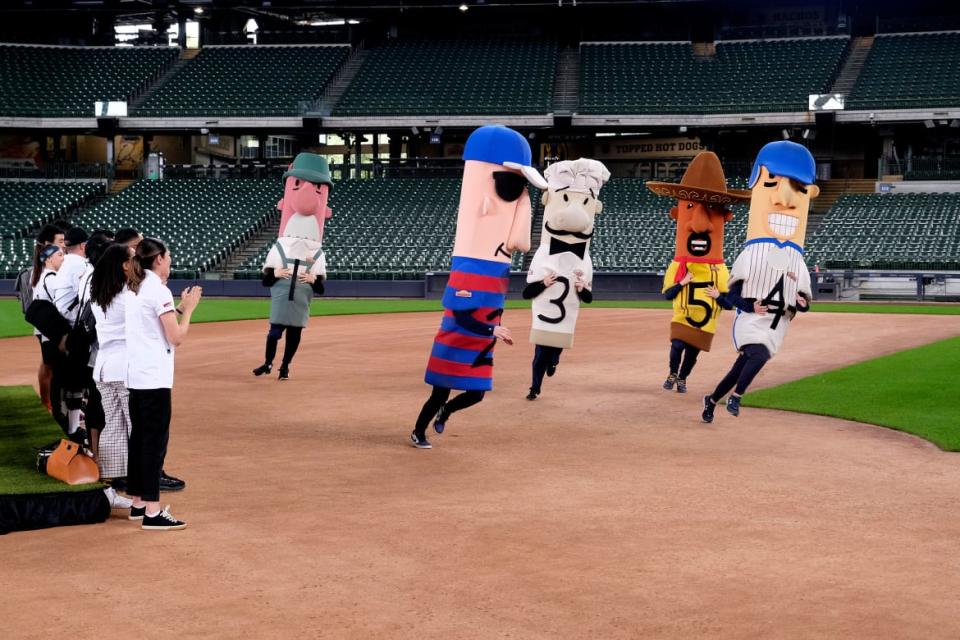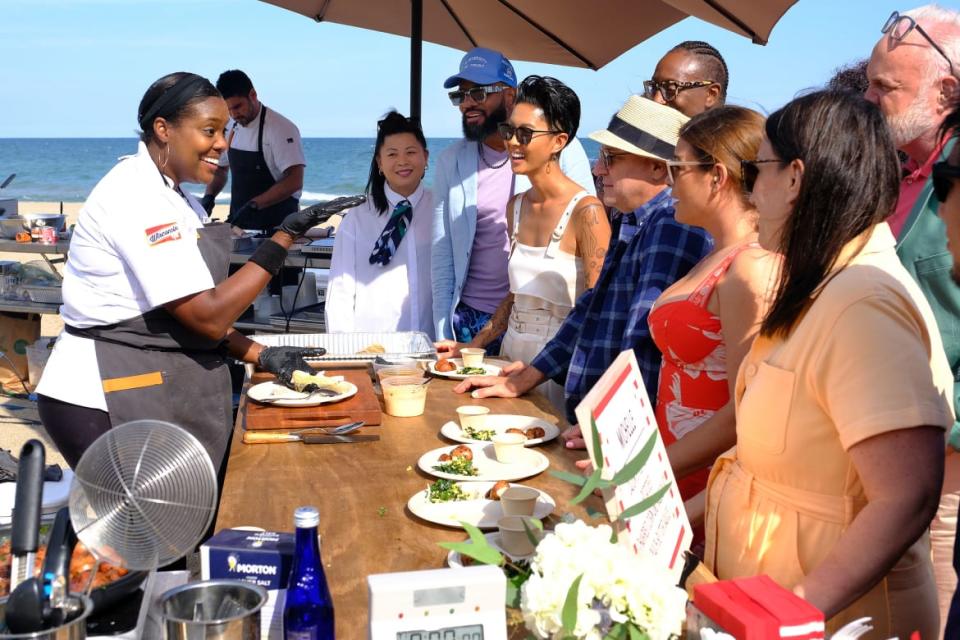How ‘Top Chef’ Navigated Its Biggest Change in 21 Seasons

It’s just after noon on a Wednesday, but the holding area at the Tribeca studio where Bravo’s Watch What Happens Live With Andy Cohen is filmed could be confused for one of the nearby clubs on a weekend night.
The crack of a can of alcoholic seltzer opening every few seconds adds percussion to the ABBA song that’s blaring over the loudspeaker. The cackling guests’ gossiping about Real Housewives is interrupted by a producer, who is giving them instructions on how to scream the name of the episode’s game during filming: “Pick! Your! Power Bottom!”
I’ll leave it to you to Google what the innuendo is there, but the game title is a reference to the current season of Top Chef, on which two contestants named themselves the Power Bottoms—whether or not they understood the reference is unclear.
The WWHL guests are the Top Chef judges: Tom Colicchio, Gail Simmons, and, in her first season, former winner and new host Kristen Kish—who each cackle when the game is announced by Cohen and the audience during the episode.
The addition of Kish has added new buzz and scrutiny for Top Chef, which has undergone the biggest reinvention in its two-decade history as a reality TV juggernaut. After 19 seasons on the show, Padma Lakshmi stepped down last year from her position as a host and judge. Kish, who had been a guest judge following her win in Season 10, was named as Lakshmi’s replacement. And the show, following a historic global season in Paris and London, decided to set the first post-Lakshmi season in, of all places, Wisconsin.
In a green room before taping WWHL, the three judges talked with The Daily Beast’s Obsessed—while eating lunch, fittingly—about the challenges and opportunity of a seismic change this season, the draw of shooting a season in the Midwest, and how the show has maintained its longevity.

The contestants of Top Chef watch as characters run around a baseball field.
The last episode featured a challenge where the contestants had to cook fish in a cauldron over a raging fire. I’ve never seen a Top Chef with as much fire as there was in the fish boil. Can you talk about what it was like to be there and see that?
Simmons: I mean, there were fire safety concerns. It was really new to the three of us as well. But I thought it really showed a tradition that I think made all the chefs really have to think. And they did not all do well! I think it was actually a really challenging episode for them, because they all took for granted that [the demonstrating chef] made it look easy. And they were like, “Oh, we’re gonna chef the shit out of this one.” And they couldn’t do it.
Colicchio: Every inch of your being and training as a chef is telling them not to do this. But this guy’s [Jeremy Klaubauf, known as “Torch”] been doing this for 20 years. And it’s good. We all ate it, the one he did.
Kish: It was very good!
Colicchio: It was good. But this is something, as a chef, you wouldn’t do: boil fish. Who does that?
Simmons: In a giant cauldron.
Colicchio: With kerosene. And there’s a purpose behind it. I don’t think the guy who was doing it was able to articulate it. But if you’re gonna boil fish like that, in a big cauldron of water with vegetables, you’re gonna get pretty good scum on the top of it. Because it just throws off impurities and proteins, a natural process. Typically, you’d get close to your pot and skim it. You can’t get close to that pot because there’s a roaring fire underneath it. So at the very, very end, he throws kerosene and it boils over. And all that scum goes away.
They do show that in the episode.
Colicchio: I occasionally watch the show. I swear.
Kish: I watch it all the time. The second the screener comes in, I’m on it like a fly on shit.
Colicchio: The problem is, when I watch them, I end up going on social media, and I want to comment on it. I stopped doing that.
Watching it, it definitely looked like a hard challenge.
Colicchio: Good!
A New ‘Top Chef’ Is Here to Make Everything in Life Better
As a reality TV fan, I was surprised that a show that got bigger and bigger each year, to the point that last season was global and shot in London and Paris, followed it up by going to Wisconsin. But I have to say, I’ve really loved this setting this year. What did you think of that choice?
Colicchio: That’s what the tourism board wants to hear.
Simmons: That was exactly it. We came off a hugely global season. London and Paris. It was a dream. It was extraordinary. It was an incredibly challenging season to make, going through it. So coming back to the States and Wisconsin, I think, was unexpected. My point of reference was minimal. But I think that’s the point. We got there, and we were pleasantly surprised.
It has really worked.
Simmons: Our executive producers do an enormous amount of research. And it allowed not just us, but then our viewers in turn, to realize that there’s a lot in this country left [undiscussed]. We all just fall back on the California, New York, and Chicago [food scenes]. That’s low-hanging fruit. We all know what’s there. Let’s go somewhere and dig a little deeper and really find out more nuanced about the smaller corners of this country. And we’ve never covered the Midwest. We went to Chicago in Season 4. But that’s not reflective, really, of the entire Midwest, right? And I think, for that reason, it really did its job.
We get to see the beer and cheese part of it, but we also get to see the indigenous cuisine culture.
Kish: Exactly. There are restaurants that I would go back to because you can only find that restaurant in Milwaukee.
Kristen, did you ever have the feeling of, “They got to go to London and Paris, and now I’m here and we’re going to Wisconsin?”
Kish: No, absolutely not. I will tell you, going into the season, I was nervous, of course. The expectation and everything. It’s a new job. And, for me, going to Milwaukee felt like it brought calm. It was safe. I grew up in Michigan. It was nice to not have to worry about all the big shiny things when I think of London or Paris. For me, it was like, OK, I get to do this first season in a place that feels like home. I can at least have that level of comfort in an otherwise, at first, uncomfortable new experience.
Colicchio: In a way, I almost prefer going there to something more well known. Because I’ve been to London. I’ve spent time there. I haven’t spent a whole lot of time in Milwaukee. So to get to spend seven weeks there, you actually get to learn the city. You’re living there. You’re not a tourist.
Simmons: Also, they were really excited to have us. London, not so much.

Michelle Wallace presents her food to the judges of Top Chef.
I imagine you all have different perspectives on this. This is a season with a huge change, with Padma leaving and having a new host. I’m curious what your fears were about a change like this, and also what excited you about it.
Kish: I can start with fears. Not only just from an internal place of, you know, starting a new job. But having watched the show and having been part of the show, three people have always represented that show consistently: these two and Padma. So to think that you’re going to be the new thing, I found, at first, to be less exciting. Personally, I was excited to do the job. But the expectation of what the viewers are gonna think, I felt like, this is a beloved show. You change something, and there's going to be opinions about it.
Fans are nothing if not vocal.
Kish: Some people don’t like change, and that’s OK. But that was really scary to think: “Oh my God, I’m going to be that person?” Because I watched it all play out as a viewer. On the other side of that, it’s also very exciting, for so many reasons. I will say that everything felt more seamless than I had ever imagined. And it felt more fun very, very quickly because of these two. Because otherwise, if you are thinking about having to go in and work with two brand-new colleagues and don't know them—there was already something there. I was able to go in and these two were the anchor, the familiar part of it. So that was very exciting.
Colicchio: No fears. I think our role was just making sure that Kristen felt welcome and prepared.
Simmons: It was a big change. When Padma first told us she was leaving, it definitely was a loss for the show. I mean, 19 seasons. She did an enormous, fantastic job. But we knew that there were other people who could do it. Our show has always been about the chefs, first and foremost. It wasn’t having to find the right person, though. I think we always knew there was really only one person. [Kristen] really was on a very short list. We also knew that the show is really about the chefs and the location. That’s the crux of our show, right? Everything else, we were gonna figure out.
That makes sense.
Simmons: We are lucky for many reasons, but it’s unprecedented that a show is on the air as long as we have been. There’s only a handful of shows. Certainly, we’re the oldest, longest-running show on Bravo, consecutively. I think we have a really amazing infrastructure. An incredible team. Our executive producer, our showrunner, started as a PA on Season 1, and has worked her way up. She’s like an encyclopedia. She’s never going to let this show fall apart just because one person leaves. One person leaving is not the end.
As a viewer, I definitely notice a different dynamic now that there’s a new person in the mix.
Kish: The swear count has gone up. I know. My mom is like, “Kristen…”
Simmons: Of course, because we have different relationships. And I think to your point, coming off of the London season, it was a good time for a change. Going into a 21st season, how do we make it fresh? How do we change things? We made some changes to the game. But having Padma leave and Kristen come on gave us another reset. It gave us an opportunity to reexamine what we do. She came in and questioned things. That can be really scary, major change this late in the game.
But also, it can be really electrifying. Like, “Wow, why did we do it this way? I don’t actually know.” It’s hard for us to see the forest from the trees. But when she came in with fresh eyes, she allowed us all to sort of snap into it a little more. I think that was really beneficial. It made it really easy, because it’s not like she wasn't already part of the family. It felt like a refresher.
Lala Kent’s Reunion Meltdown Shreds the ‘Vanderpump Rules’ Fourth Wall
A lot of reality shows add overcomplicated twists and confusing gameplay as they go on. Top Chef has added twists, but they never seem outside of the integrity of the show. What is the secret to evolving the game without losing that spirit?
Colicchio: Usually, when we add a twist, we’re doing it for a reason. It’s usually more organic. It's not like, “Oh, we’ve got to mix it up. Let’s do something crazy.” That’s not gonna fly. There was always a struggle in the show with, “You’re cooking for the Quickfire round, and what’s the point of doing it if you don’t judge it?” Like, you win immunity? OK. Fine. But it doesn’t factor into the overall judging. So this was a way to do that, which makes sense.
Right, that does make sense.
Colicchio: Also, it was a way for Gail and I to spend more time with the chefs. It’s also unexpected. So the first time we walked in there, they were like, “What the hell is going on?”
Kish: It was so good.
Colicchio: It keeps them on their toes. But it also gives us something else to factor in our decisions. In a way it’s good to factor in every dish. The only time we use it is if it’s really, really close. But again, it wasn't done just to “shake it up.” It was done because we’ve always felt that the Quickfire has been shortchanged. I was honestly like, “Let’s get rid of the Quickfire.” If it doesn’t mean much, let’s get rid of it. We can spend more time on the challenge. That might be too much of a change, though.
Get the Daily Beast's biggest scoops and scandals delivered right to your inbox. Sign up now.
Stay informed and gain unlimited access to the Daily Beast's unmatched reporting. Subscribe now.

 Yahoo News
Yahoo News 
